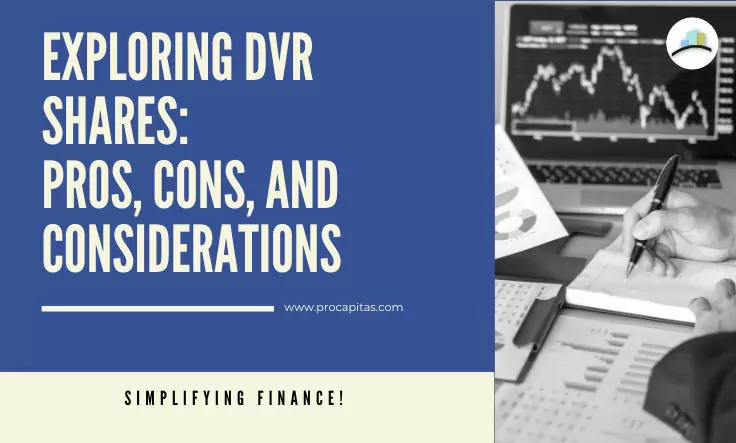Investing in the stock market is always a venture filled with uncertainties and complexities.
Among the multitude of options available to investors, one intriguing choice is investing in Differential Voting Rights (DVR) shares.
DVR shares offer unique opportunities and challenges, making them a subject of interest for many investors.
But should you invest in DVR shares? Let's delve deeper into this topic.
Introduction to DVR Shares
DVR shares are a class of shares issued by companies that grant different voting rights compared to their regular shares.
These shares are designed to attract investors who seek exposure to the company's growth potential without the full voting power typically associated with common shares.
Pros of Investing in DVR Shares
Lower Cost
One of the primary advantages of DVR shares is their lower cost compared to regular shares of the same company.
This affordability allows investors with limited capital to gain exposure to well-established companies that they might not otherwise afford.
Voting Rights
While DVR shares come with reduced voting rights, they still provide investors with a voice in the company's decision-making process.
This partial ownership can be appealing to investors who wish to be involved in corporate governance to some extent.
Potential for Higher Returns
In certain cases, DVR shares have the potential to outperform regular shares, especially during periods of strong company performance.
This higher return potential can attract investors seeking above-average growth opportunities.
Cons of Investing in DVR Shares
Limited Voting Rights
The reduced voting rights associated with DVR shares mean that investors have less influence over important corporate decisions compared to holders of regular shares.
This limitation may deter investors who prioritize voting power.
Potential for Dilution
Companies issuing DVR shares may resort to additional share issuances, leading to a dilution of existing shareholders' equity.
This dilution can affect the value of DVR shares negatively.
Market Perception
DVR shares may face scepticism from certain investors and analysts who view them as a way for company insiders to retain control while raising capital.
This negative perception can impact the demand and liquidity of DVR shares in the market.
Factors to Consider Before Investing
Before investing in DVR shares, it's essential to consider various factors:
Company's Growth Prospects
Evaluate the company's growth prospects, including its business model, industry trends, and competitive advantage.
Financial Health
Assess the company's financial health by examining its balance sheet, income statement, and cash flow statement.
Market Conditions
Consider the prevailing market conditions, including macroeconomic factors, industry dynamics, and regulatory environment.
Comparison with Regular Shares
DVR shares differ from regular shares primarily in terms of voting rights and sometimes dividend entitlements.
Regular shares typically offer full voting rights and equal treatment in terms of dividends.
Case Studies of Successful DVR Investments
Several companies have issued DVR shares successfully, including tech giants like Google and Facebook.
These case studies highlight the potential benefits of investing in DVR shares when aligned with the company's growth trajectory.
How to Invest in DVR Shares
Investing in DVR shares involves a few steps:
Steps to Follow
- Research and identify companies offering DVR shares.
- Evaluate the fundamentals and growth prospects of each company.
- Open a brokerage account capable of trading DVR shares.
- Place buy orders for the desired number of DVR shares.
Tips for Beginners
- Start with small investments to minimize risk.
- Diversify your portfolio to spread risk across different companies and industries.
- Stay informed about market developments and company news.
Risks Associated with DVR Investments
DVR investments come with certain risks, including:
Volatility
DVR shares can be more volatile than regular shares due to their unique characteristics and limited liquidity.
Regulatory Changes
Changes in regulatory requirements or corporate governance standards can impact the value and attractiveness of DVR shares.
Expert Opinions on DVR Investments
Experts have varying opinions on DVR investments, with some advocating for their potential benefits in certain situations, while others remain cautious due to the associated risks.
FAQs
What are DVR shares?
DVR shares are a class of shares issued by companies that grant different voting rights compared to their regular shares.
Are DVR shares suitable for long-term investment?
DVR shares can be suitable for long-term investment depending on the individual investor's risk tolerance and investment objectives.
How do DVR shares differ from regular shares?
DVR shares typically offer reduced voting rights and sometimes different dividend entitlements compared to regular shares of the same company.
Can investing in DVR shares be profitable?
Investing in DVR shares can be profitable if the underlying company performs well and if the investor's investment thesis proves to be accurate.
What are the risks of investing in DVR shares?
Risks associated with investing in DVR shares include limited voting rights, potential for dilution, market perception, volatility, and regulatory changes.
Conclusion
Investing in DVR shares can be a viable option for investors seeking exposure to companies with growth potential while accepting reduced voting rights. However, it's crucial to conduct thorough research and consider the risks involved before making investment decisions.











 1,499
1,499
